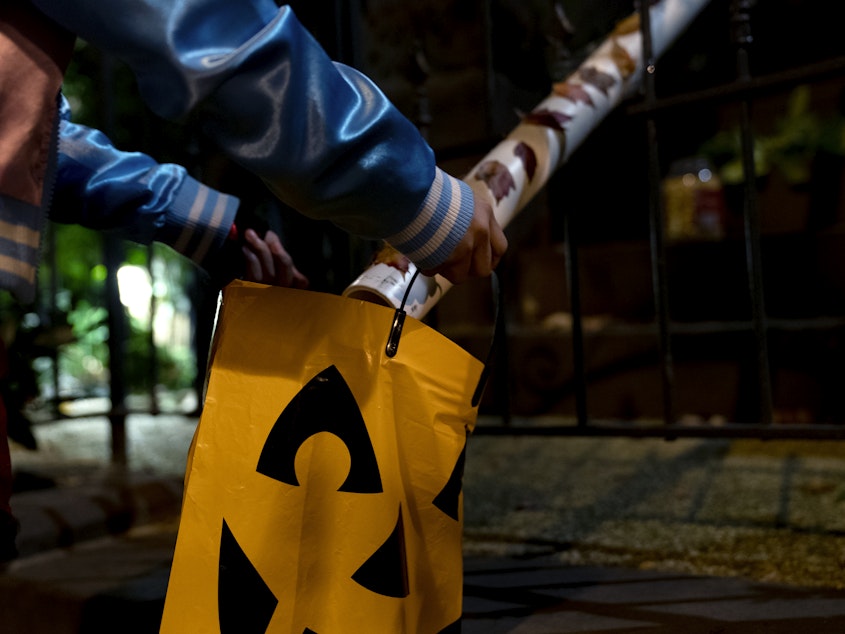Unfounded fears about rainbow fentanyl become the latest Halloween boogeyman

Forget horror movies, haunted houses or decorations that seem a little too realistic. For many, paranoia around drug-laced candy can make trick-or-treating the ultimate scare.
"We've pretty much stopped believing in ghosts and goblins, but we believe in criminals," said Joel Best, a professor of criminology and criminal justice at the University of Delaware. "We tell each other scary stories about Halloween criminals and it resonates. It takes the underlying cultural message of the holiday — spooky stuff — and links it to contemporary fears."
Updated October 31, 2022 at 10:27 AM ET
Although it's normal to hear concerns over what a child may receive when they go trick-or-treating, misinformation this year has been particularly persistent.
In August, the U.S. Drug Enforcement Administration alerted the public to the existence of bright-colored fentanyl pills that resemble candy — now dubbed "rainbow fentanyl." The DEA warned that the pills were a deliberate scheme by drug cartels to sell addictive fentanyl to children and young people.
Sponsored
Although the agency didn't mention Halloween specifically, people remain alarmed this holiday following the DEA's warning.
Drug experts, however, say that there is no new fentanyl threat to kids this Halloween.
Best said that in the decades he's spent researching this topic, he's never once found "any evidence that any child has ever been killed, or seriously hurt, by a treat found in the course of trick-or-treating."
Brandon del Pozo, an assistant professor of medicine and health services at Brown University, also points to a general sense of fear and paranoia connected to the pandemic, crime rates and the overdose epidemic.
"There's just enough about fentanyl that is true in this case that makes it a gripping narrative," del Pozo said. "It is extremely potent. There are a lot of counterfeit pills that are causing fatal overdoses and the cartels have, in fact, added color to those pills. And tobacco and alcohol companies have used color to promote their products to a younger audience."
Sponsored
Dr. Ryan Marino, medical toxicologist, emergency physician and addiction medicine specialist at University Hospitals Cleveland Medical Center, also points to the upcoming midterm elections.
"It also seems to have become heavily politicized because this is a very tense election year with very intense partisan politics," he said. "It also seems as if people are using fentanyl for political purposes."
Sheila Vakharia, the deputy director of the department of research and academic engagement at the Drug Policy Alliance, says the attention that misinformation about rainbow fentanyl receives takes away from the realities of the overdose crisis.
The drug overdose crisis, she explained, has claimed more than 1 million lives in two decades, and overdose deaths only continue to increase. Nearly 92,000 people died because of a drug overdose in 2020, according to the National Institute on Drug Abuse.
"When we talk about fentanyl, and we see it in the headlines and we see that people are dying of overdoses involving this drug, we should think: How do we keep people alive?'' she said. ''And how do we keep the people most at risk of exposure alive?"
Sponsored
And while the experts believe that parents have little to fear when they take their kids trick or treating on Halloween — and that the attention around rainbow fentanyl will die down — misinformation about drug-laced candy is almost guaranteed to rise up from the dead again.
"I doubt that rainbow fentanyl is going to stick around for a second year," Best said. "But are we going to be worried about Halloween poisoning? Absolutely. We worry about it every year." [Copyright 2022 NPR]


